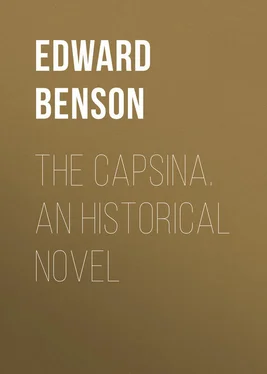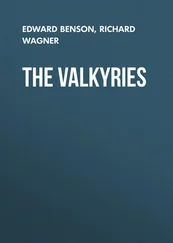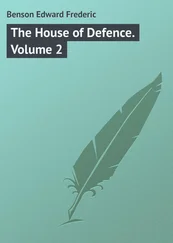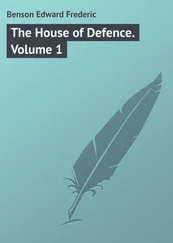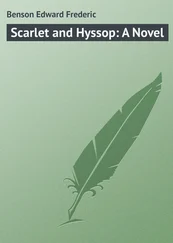Edward Benson - The Capsina. An Historical Novel
Здесь есть возможность читать онлайн «Edward Benson - The Capsina. An Historical Novel» — ознакомительный отрывок электронной книги совершенно бесплатно, а после прочтения отрывка купить полную версию. В некоторых случаях можно слушать аудио, скачать через торрент в формате fb2 и присутствует краткое содержание. Жанр: foreign_language, foreign_prose, на английском языке. Описание произведения, (предисловие) а так же отзывы посетителей доступны на портале библиотеки ЛибКат.
- Название:The Capsina. An Historical Novel
- Автор:
- Жанр:
- Год:неизвестен
- ISBN:нет данных
- Рейтинг книги:4 / 5. Голосов: 1
-
Избранное:Добавить в избранное
- Отзывы:
-
Ваша оценка:
- 80
- 1
- 2
- 3
- 4
- 5
The Capsina. An Historical Novel: краткое содержание, описание и аннотация
Предлагаем к чтению аннотацию, описание, краткое содержание или предисловие (зависит от того, что написал сам автор книги «The Capsina. An Historical Novel»). Если вы не нашли необходимую информацию о книге — напишите в комментариях, мы постараемся отыскать её.
The Capsina. An Historical Novel — читать онлайн ознакомительный отрывок
Ниже представлен текст книги, разбитый по страницам. Система сохранения места последней прочитанной страницы, позволяет с удобством читать онлайн бесплатно книгу «The Capsina. An Historical Novel», без необходимости каждый раз заново искать на чём Вы остановились. Поставьте закладку, и сможете в любой момент перейти на страницу, на которой закончили чтение.
Интервал:
Закладка:
Presently after Kanaris went down to the harbor to get the Sophia ready for sea. With a fair wind it was only two hours to Kranidi. The navigation was simple: a dozen men could work the ship, and they would be back before morning.
The Capsina took down two pistols, and proceeded to tell Economos what he was to do. He must walk straight to the quay and quickly. He must stop to speak to no man, and not fire unless attacked. She would be in the shadow of her own gate, Kanaris at the lower end of the street, where it opened on to the quay, so that should any attempt be made on his life the assassin would be hemmed in on both sides.
"Yet, yet," she said, hesitating, "ought I to warn Nikolas that I know? It seems a Turkish thing to do, to set a trap for a man. Really, I am afraid I should do the same to you if I were he, only I think I should have the grace to kill you myself, for I cannot think I would have my dirty work done for me, and I should not be such a fool as to ask you to supper. I don't want this wretched Dimitri to be killed – I wonder what Nikolas has paid him? Yes, it shall be so; one who attacks in the dark for no quarrel of his own will be ever a coward. So shoot in the air, only to show you are armed, and leave Dimitri to me."
At the end of the hour Economos rose to go. The Capsina went with him to the gate, and from the shadow looked cautiously out down the road. The far end of it, a hundred and fifty yards off, opened on to the brightly lighted quay, and against the glare she saw the figure of a man silhouetted by the long creeper-covered wall to the right of the road.
"Yes, that is Dimitri," she whispered. "Begone, and God-speed. Don't shoot, except to save your own life. Run rather."
She stepped back under cover of her gate, and looked after Economos. He had not gone more than twenty yards when she heard a quick but shuffling step coming down towards her from above, and, looking up, saw Father Nikolas. Standing as she did, in a shadowed embrasure, he passed her by unnoticed, and went swiftly and silently across the road, and waited in the shadow of the opposite wall. He had passed so close to her that she could almost have touched him. Then for a moment there was silence, save only for the sounds of life on the quay and the rapid step of Economos, getting fainter every second. Then came a sudden scuffle, a shot, and the steps of a running man getting louder every moment. She was just about to step out and stop him, when Father Nikolas advanced from opposite. The man gave a little sobbing cry of fright, till he saw who it was.
"You have failed," said Nikolas, in a low voice.
"Yes, and may the curses of all the saints be upon you!" cried Dimitri. "You told me he went unarmed. You told me – Ah, God! who is that?"
The Capsina stepped out of the shadow.
"Yes, he has failed," she said. "And you, too, have failed. This is a fine thing for the Church of Hydra. Man, stop where you are. Not a step nearer. I, too, am armed. By God," she exclaimed, suddenly, rising an octave of passion and contempt, and throwing her pistol over the gate into her garden, "come a step nearer if you dare, you or your hired assassin – I am unarmed. You dare not, you dare not commit your murders yourself, you low, sneaking blackguard, who would kill men under the guise of friendship. You asked Economos to supper to-night, regretting he was going so soon: that would have been the surest way! Instead, you send another to cut his throat in the dark. You have failed," and she laughed loud, but without merriment. "A fine, noble priest are you! Hydra is proud of you, the clan delights in you! In the name of the clan I pay you my homage and my reverence."
Not a word said Father Nikolas.
"So you have no reply ready," she went on. "Indeed, I do not wonder. And for you, Dimitri, is it not shame that you would do the bidding of a man like this? Now, tell me at once, what did he give you for this?"
"If you dare tell – " whispered Nikolas.
"Oho! So there is perhaps something even more splendid and noble to come! If you dare not tell, rather," said Sophia. "Quick, man, tell me quickly."
The man fell on his knees.
"Capsina, I dare not tell you all," he said. "But I have a disgraceful secret, and Father Nikolas knew it. He threatened me with exposure."
The Capsina turned to Nikolas.
"So – this grows dirtier and more ugly, and even more foolish than I thought, for I did you too much justice. Devil I knew you were, but I gave you the credit for being cunning. It is not very safe for a man like you to threaten exposure, is it?"
And she turned and went a step nearer to him.
Father Nikolas, in a sudden frenzy, ran a couple of steps towards her, as if he would have seized her. For answer she struck him in the face.
"That for you," she said, suddenly flaming again into passion – "that for you; go and tell the primates that I have struck a priest. It is sacrilege, I believe, and never was I more satisfied with a deed. Run, tell them how I have struck you, and get me punished. Sacrilege? Is it not sacrilege when a man like you shows the people the blessed body and blood? You are afraid of man, it seems – for you dared not touch Economos yourself – but it seems you hold God in contempt. You living lie, you beast! Stand still and listen."
And she told Dimitri the story of Nikolas's marriage. Then, turning again: "So that is quits," said she, "between you."
Then to Nikolas: "Now go," she said, "and remember you are in the hollow of my hand. Will you come at night and try to kill me? I think not."
Nikolas turned and went without a word.
The Capsina saw him disappear, and then spoke to Dimitri.
"You poor, wretched creature!" she said. "You have had a lesson to-night, I am thinking. Go down on your knees – not to me, but to the blessed Jesus. I forgive you? That is no word from one man to another. Go to the church, man, or to your home, or even here, and be sorry."
"Capsina! oh Capsina!" sobbed the man.
Sophia felt strangely moved, and she looked at him with glistening eyes.
"You poor devil! oh, you poor devil!" she said. "Just go by yourself alone somewhere and think how great a brute you are. Indeed, you are not a fine man, and I say this with no anger, but with very much pity. You had no grudge against Economos. Yet because you were afraid you would do this thing. Thank God that your fear saved you, your miserable fear of an ounce of lead. What stuff are you made of, man? What can matter less than whether you live or die? Yet it matters very much how you live and how you die. There, shake hands and go."
CHAPTER IV
The fleet put to sea again in the last week of May, cruising in the Archipelago, eager for the spring coming of the Ottoman ships. They took a northeasterly course, and on the 5th of June sighted a single Turkish man-of-war to the north of Chios. But it put about, before they were in range to attack, and ran before them to the mainland, anchoring in the harbor of Erissos, beneath the walls of the Turkish fort. To attack it there at close quarters meant exposure to the fire from the fort as well; moreover, the harbor was nearly landlocked, and thoroughly unsuited to that rapidity of manoeuvre by which alone these little hawks could dare attack the ravens of the Turkish fleet, for, except when the sea-breeze blew, it lay nigh windless. Tombazes could scarce leave it to sail south, but his plan of action was determined by the appearance, on the morning of the 6th of June, of more Ottoman ships from the north – a man-of-war, three frigates, and three sloops – and before noon news arrived from a Greek town called Aivali, farther up the Asiatic coast, that the garrison of Turks had been suddenly increased in the town.
Here, then, was work sufficient: the single Turk must not sail south, the fresh convoy of ships must be stopped, and help must be sent to Aivali. What this increase of garrison might mean, Tombazes could not conjecture, but he told off fifteen vessels to follow the Turkish ships, while the rest waited at Erissos to destroy the blockaded vessel at all costs and with all speed, and then sail on to Aivali. A meeting of the captains was held on the admiral's ship, and it was resolved to attempt the destruction of the Turk by fire. A Psarian in the fleet was said to know the use and handling of fire-ships, and one was prepared, but badly managed, and the only result was that two of its crew were first nearly roasted and then completely drowned. However, on the following day another Psarian volunteered to launch one, which was managed with more conspicuous success. The boat was loaded with brushwood, and brushwood and sails were soaked in turpentine. It set off from the fleet while it was yet dark, and, conveniently for the purpose, a white mist lay over the harbor. The air was windless, and it had to be rowed swiftly and silently up to the anchorage of the Turk. They had approached to within a cable's length when they were sighted from on board the enemy, but the captain of the fire-ship, Pappanikolo, knowing that a few moments more would see the work done, urged the men on, and drove his boat right into the bows of the Turk, contriving to entangle his mast in the bowsprit ropes. Then, bidding his men jump into the boat they towed behind, he set fire to the ship and rowed rapidly off. A few muskets only were fired at them, and they escaped unhurt. Not so their victim. In a moment the fire-ship blazed from stem to stern, pouring such vast clouds of smoke up from the brushwood, which was not quite dry, that it was impossible for those on board or from the fort to reach the seat of the flames. Many of the sailors jumped overboard and swam to land, but the ship itself burned on till the fire reached the powder-magazine and exploded it.
Читать дальшеИнтервал:
Закладка:
Похожие книги на «The Capsina. An Historical Novel»
Представляем Вашему вниманию похожие книги на «The Capsina. An Historical Novel» списком для выбора. Мы отобрали схожую по названию и смыслу литературу в надежде предоставить читателям больше вариантов отыскать новые, интересные, ещё непрочитанные произведения.
Обсуждение, отзывы о книге «The Capsina. An Historical Novel» и просто собственные мнения читателей. Оставьте ваши комментарии, напишите, что Вы думаете о произведении, его смысле или главных героях. Укажите что конкретно понравилось, а что нет, и почему Вы так считаете.
